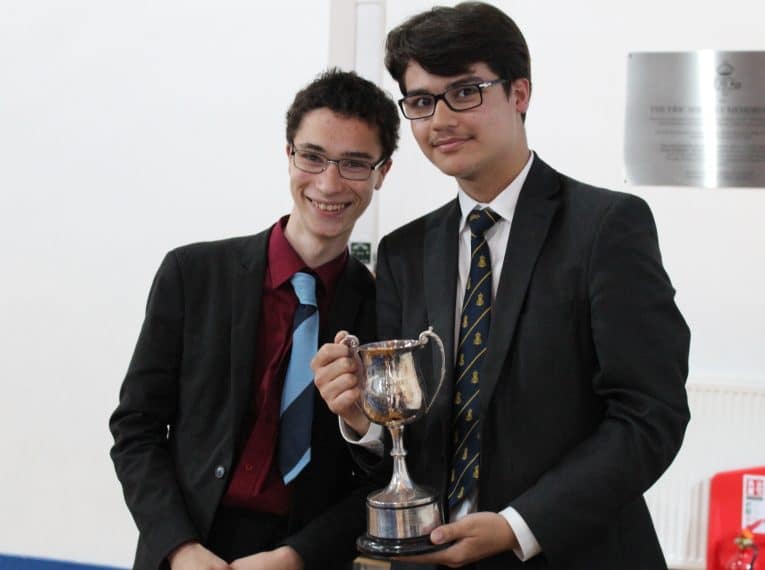
Broughton have been crowned this year’s top House at Queen Elizabeth’s School, following intense competition in fields as diverse as architecture and dodgeball.
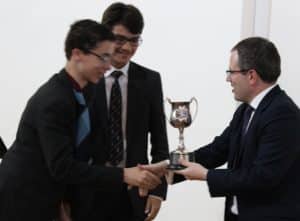 A strong performance at Sports Day helped Broughton overtake Pearce to claim overall victory as the leader of QE’s six houses – a victory announced to great excitement at the end-of-year House Assembly.
A strong performance at Sports Day helped Broughton overtake Pearce to claim overall victory as the leader of QE’s six houses – a victory announced to great excitement at the end-of-year House Assembly.
Broughton’s House Captain, Saifullah Shah, and Deputy House Captain, Jamie Watkin-Rees, both of Year 12, were duly presented with the coveted House Cup by Headmaster Neil Enright.
Mr Enright said afterwards: “It has been another year of outstanding endeavour among the Houses, which play such an important role in fostering teamwork and friendship. My sincere congratulations go to all Broughton boys on their hard-won victory.”
During the assembly, Year 12’s Kieran Dhrona and Rishi Shah gave a presentation on the extensive fund-raising that takes place during the year in support of various charities as well as QE’s long-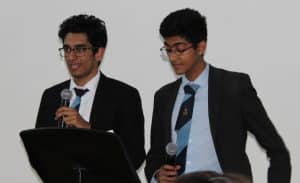 running Sai School Appeal, which aims to help the Sri Sathya Sai English Medium School in Kerala, India.
running Sai School Appeal, which aims to help the Sri Sathya Sai English Medium School in Kerala, India.
QE’s overall charity this year was the Great Ormond Street Hospital Charity, while there were also Christmas collections of food for the Chipping Barnet Foodbank and of clothing for a charity helping some of the 168,000 people homeless people in London.
Among the charity events staged were an inter-House dodgeball tournament run by Broughton and Harrisons’ for Years 7–9, which raised £280. Leicester and Pearce ran an interactive quiz for Years 7–10, raising £168. And Stapylton and Underne organised a guess-the-teacher baby photo competition, raising £87.70.
 For the Sai School Appeal, a FIFA Tournament saw staff and pupils battle it out, games controllers in hand, in what was perhaps the most popular charity event of the year. One notable match included that between the Headmaster and the 2019 School Captain, Bhiramah Rammanohar.
For the Sai School Appeal, a FIFA Tournament saw staff and pupils battle it out, games controllers in hand, in what was perhaps the most popular charity event of the year. One notable match included that between the Headmaster and the 2019 School Captain, Bhiramah Rammanohar.
The tournament raised £120.60, while a swimathon raised £609.65 and a guess-the-number-of-sweets-in-the-jar challenge at the Founder’s Day Fete brought in £62.
The House competitions reported on during the assembly included the:
- Year 7 House afternoon won by Stapylton
- In the Scoop news contest for Year 8 won by Pearce
- Languages competition, in which boys were challenged to design a poster about an influential linguist or speaker of German. French or Latin
- Architectural Enrichment Competition, won by Harrisons’
- QIQE quiz, won by Broughton in a tough final against Stapylton.
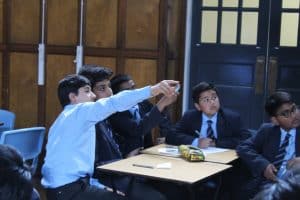 The assembly also reviewed other activities of the year.
The assembly also reviewed other activities of the year.
For drama, as well as looking back at the performances at the Shakespeare Schools Festival and at the School Play, Lord of the Flies, the presentation revealed the names of boys who have successfully auditioned for roles in next term’s Shakespeare, The Merchant of Venice.
Hundreds of boys have taken part in musical extra-curricular activities during the year. There are currently more than 20 ensembles, many of them pupil-led, involving 150 singers and nearly 200 instrumentalists. The 35 winners of Music colours from across the year groups were announced.
The assembly celebrated the winners of the separate QE chess championships for Year 7 and for 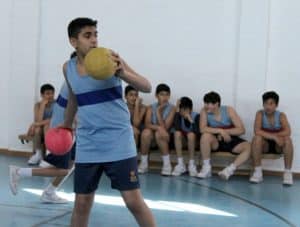 Years 8-11, as well as those who performed strongly in the UK Chess Challenge. Junior, intermediate and senior chess colours were presented.
Years 8-11, as well as those who performed strongly in the UK Chess Challenge. Junior, intermediate and senior chess colours were presented.
A report on the Duke of Edinburgh Award revealed that 87 Year 11 boys completed their bronze awards. Twenty-six Year 12s finished their silver awards, while 11 Year 13s completed D of E at gold level.
In sport, the assembly covered the following highlights:
- Cricket: The Year 8 team reached the quarter-finals of the National Cup, where they lost on the last ball
- Rugby: The U16s won the Hertfordshire plate; several boys gained county honours and a successful tour to Holland took place
- Eton fives: Record levels of participation at QE brought encouraging successes at the sport’s national finals
- Athletics: Combined Year 7 & 8 and 9 & 10 teams reached regional finals, and stand-out individual performances were listed
- Water polo: Both the seniors and Year 10 reached their respective national cup plate finals.
‘Teams of the year’, comprising selections from across the year groups, were announced for cricket and rugby.
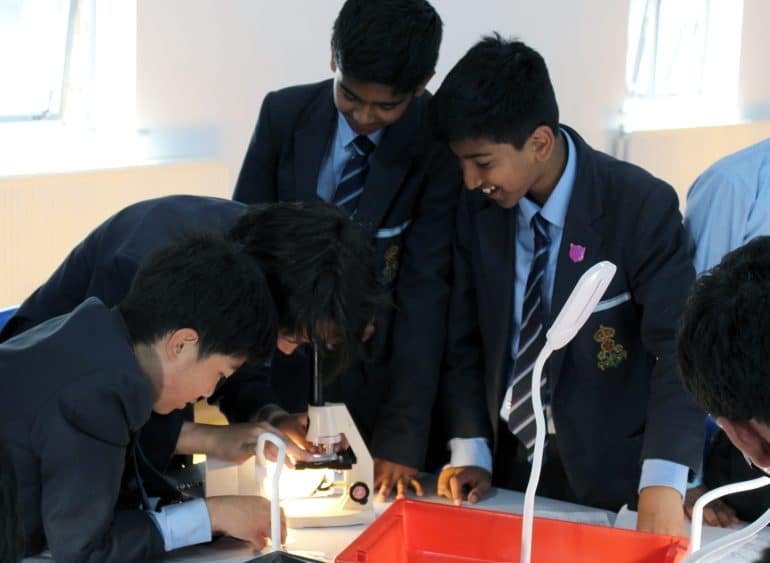
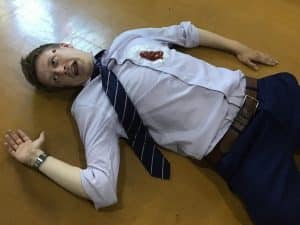 After the gruesome discovery of Extra-curricular Enrichment Tutor Keith Bugler’s lifeless body, House teams spent a morning of QE’s Enrichment Week combing through clues in a range of activities that involved skills drawn from across the curriculum.
After the gruesome discovery of Extra-curricular Enrichment Tutor Keith Bugler’s lifeless body, House teams spent a morning of QE’s Enrichment Week combing through clues in a range of activities that involved skills drawn from across the curriculum.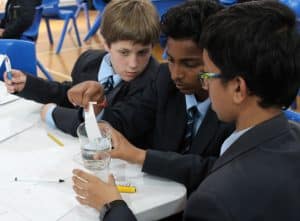 d of Extra-curricular Enrichment Rebecca Grundy, who is a Languages teacher, had organised the day jointly with Dr Bugler, who was a Chemistry teacher before his untimely demise.
d of Extra-curricular Enrichment Rebecca Grundy, who is a Languages teacher, had organised the day jointly with Dr Bugler, who was a Chemistry teacher before his untimely demise.

 A strong performance at Sports Day helped Broughton overtake Pearce to claim overall victory as the leader of QE’s six houses – a victory announced to great excitement at the end-of-year House Assembly.
A strong performance at Sports Day helped Broughton overtake Pearce to claim overall victory as the leader of QE’s six houses – a victory announced to great excitement at the end-of-year House Assembly. running Sai School Appeal, which aims to help the Sri Sathya Sai English Medium School in Kerala, India.
running Sai School Appeal, which aims to help the Sri Sathya Sai English Medium School in Kerala, India. For the Sai School Appeal, a FIFA Tournament saw staff and pupils battle it out, games controllers in hand, in what was perhaps the most popular charity event of the year. One notable match included that between the Headmaster and the 2019 School Captain, Bhiramah Rammanohar.
For the Sai School Appeal, a FIFA Tournament saw staff and pupils battle it out, games controllers in hand, in what was perhaps the most popular charity event of the year. One notable match included that between the Headmaster and the 2019 School Captain, Bhiramah Rammanohar. The assembly also reviewed other activities of the year.
The assembly also reviewed other activities of the year. Years 8-11, as well as those who performed strongly in the UK Chess Challenge. Junior, intermediate and senior chess colours were presented.
Years 8-11, as well as those who performed strongly in the UK Chess Challenge. Junior, intermediate and senior chess colours were presented.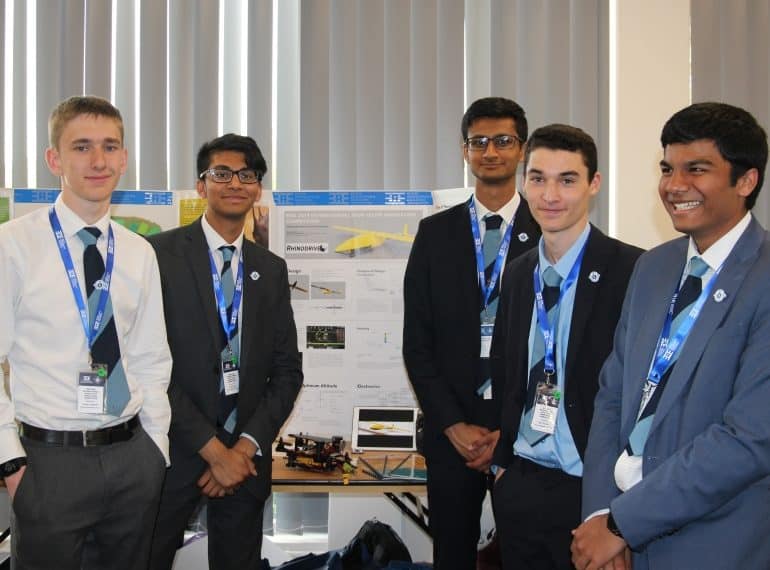
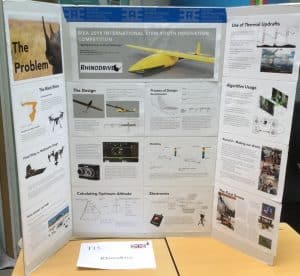 Judges at the live finals of the International STEM Youth Innovation Competition at the Royal Air Force Museum in Colindale, London, unanimously agreed that QE’s Year 12 Rhinodrive team should win the Oral Presentation Award.
Judges at the live finals of the International STEM Youth Innovation Competition at the Royal Air Force Museum in Colindale, London, unanimously agreed that QE’s Year 12 Rhinodrive team should win the Oral Presentation Award.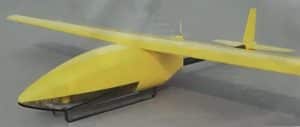 The team comprised Deeps Gandhi, Aryan Jain, Simon Sherriff, Ben Domb and Tarun Bhaskaran. They secured their place in the international finals partly because they opted to design and build their own drone using parts which they 3D-printed themselves, rather than buying an off-the-shelf, proprietary machine, as many other teams did. “This set them in an élite group, along with a gifted and talented academy team from Palo Alto, California,” said Mr Noonan.
The team comprised Deeps Gandhi, Aryan Jain, Simon Sherriff, Ben Domb and Tarun Bhaskaran. They secured their place in the international finals partly because they opted to design and build their own drone using parts which they 3D-printed themselves, rather than buying an off-the-shelf, proprietary machine, as many other teams did. “This set them in an élite group, along with a gifted and talented academy team from Palo Alto, California,” said Mr Noonan.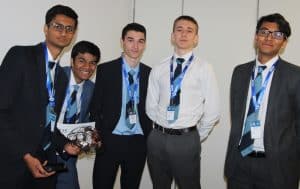 Team member Deeps said: “Participating in this competition has not only allowed us to think about our ability to impact global issues such as conservation through STEM, but has also taught us key skills such as time management, teamwork and communication.”
Team member Deeps said: “Participating in this competition has not only allowed us to think about our ability to impact global issues such as conservation through STEM, but has also taught us key skills such as time management, teamwork and communication.”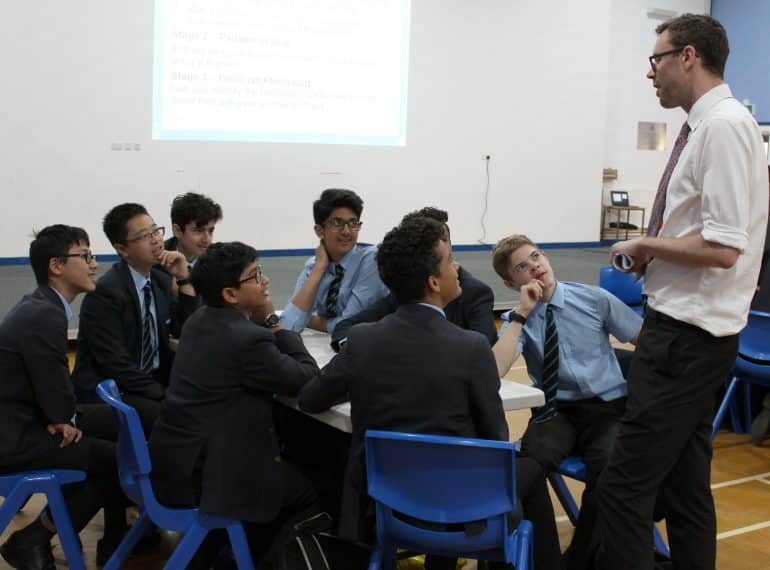
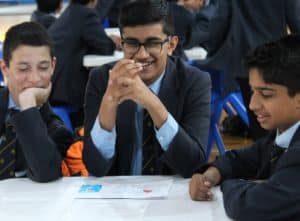
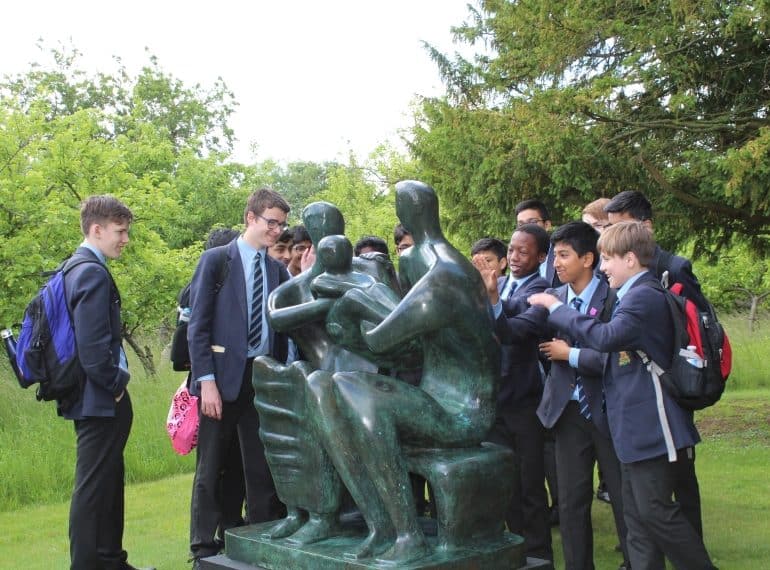
 Not only did the Art trip give the pupils an opportunity to experience his spectacular outdoor sculptures in the beautiful grounds near Much Hadham, but they were also able to see the largest exhibition of his drawings in more than 40 years.
Not only did the Art trip give the pupils an opportunity to experience his spectacular outdoor sculptures in the beautiful grounds near Much Hadham, but they were also able to see the largest exhibition of his drawings in more than 40 years.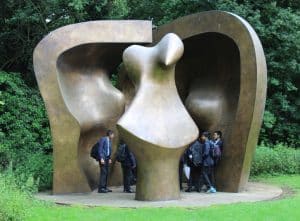 “The foundation displays a fantastic collection of his sculptural work. The students were taken on a tour of the grounds by informative guides who described the inspiration and construction behind these iconic pieces,” said Mrs McAteer.
“The foundation displays a fantastic collection of his sculptural work. The students were taken on a tour of the grounds by informative guides who described the inspiration and construction behind these iconic pieces,” said Mrs McAteer.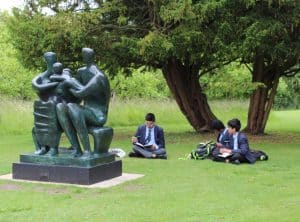 The trip began with a tour of Moore’s larger sculptures, before the group ventured inside his numerous workshops to look at his smaller, finer work. Here, said Sai, they picked up tips for improving their own sculpting, such as incorporating the appearance of bones and using textures inspired by nature, such as bark.
The trip began with a tour of Moore’s larger sculptures, before the group ventured inside his numerous workshops to look at his smaller, finer work. Here, said Sai, they picked up tips for improving their own sculpting, such as incorporating the appearance of bones and using textures inspired by nature, such as bark.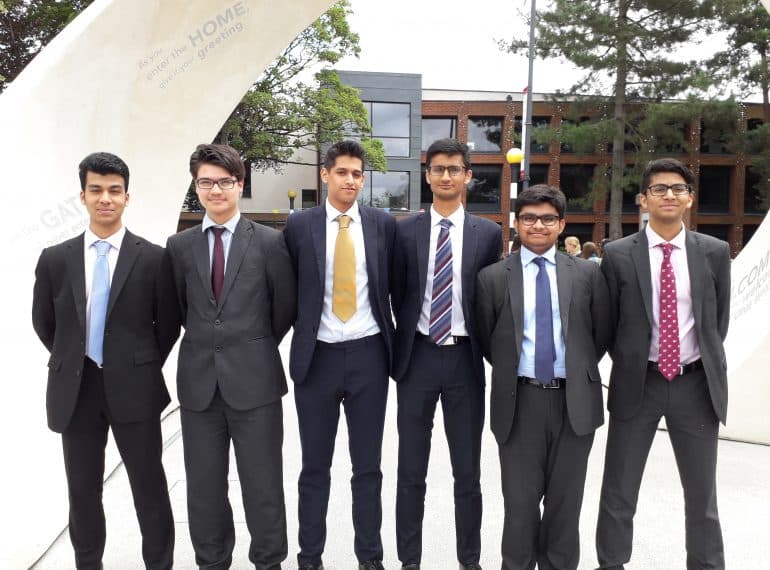
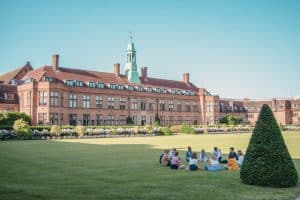 Having won their places with a barnstorming performance at the South East Regional Session – the third consecutive year in which QE has progressed – the Year 12 team were well-prepared for the four-day national event at Liverpool Hope University, for which the theme was Tomorrow’s Europe: Making every voice heard.
Having won their places with a barnstorming performance at the South East Regional Session – the third consecutive year in which QE has progressed – the Year 12 team were well-prepared for the four-day national event at Liverpool Hope University, for which the theme was Tomorrow’s Europe: Making every voice heard. The team also broke new ground for QE, at least over recent years, by taking part in the session’s Saturday-night ‘Euroconcert’. “Introduced by the organisers as ‘the UK’s hottest new boy band, the whole team gave an enthusiastic and tuneful performance of the Backstreet Boys’ I want it that way. Frontman Saifullah Shah stole the show and really engaged the audience!”
The team also broke new ground for QE, at least over recent years, by taking part in the session’s Saturday-night ‘Euroconcert’. “Introduced by the organisers as ‘the UK’s hottest new boy band, the whole team gave an enthusiastic and tuneful performance of the Backstreet Boys’ I want it that way. Frontman Saifullah Shah stole the show and really engaged the audience!”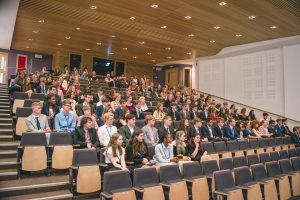 In the session devoted to the first of the two Committees on Employment and Social Affairs (‘EMPL1’), delegates debated the isolation of the elderly. Deeps Gandhi was among a committee that submitted a motion which, inter alia, urged EU member states to appoint a minister for loneliness and subsidise care for the elderly by providing means-tested financial aid to families.
In the session devoted to the first of the two Committees on Employment and Social Affairs (‘EMPL1’), delegates debated the isolation of the elderly. Deeps Gandhi was among a committee that submitted a motion which, inter alia, urged EU member states to appoint a minister for loneliness and subsidise care for the elderly by providing means-tested financial aid to families.